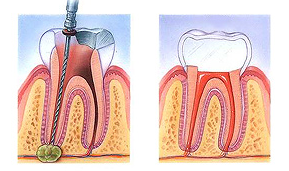Inside each tooth, under the enamel and a hard layer called dentin, is soft pulp. The pulp contains blood vessels, nerves, and connective tissue. In dentistry, endodontics deals with this tooth interior and focuses on preventing, diagnosing, and treating diseases and injuries to it.
The pulp is contained in a canal, a thin, tube-like channel extending from the crown of the tooth to the tip of its root within the jawbone where the pulp connects to the tissues surrounding the root of the tooth. The pulp is essential for the proper and healthy development of the tooth.
Pulp infection
It is important to understand that tooth decay can progress down into the pulp. When this happens, the pulp can become infected, which can be very painful and can also deteriorate into an abscessed tooth. An abscess occurs when infection and swelling develops in the tissues around or beneath the tooth. When the pulp becomes infected or the tooth becomes abscessed, it is necessary to perform a root canal.
Root canal
Root canal treatment is recommended when decay will likely damage or has already killed the tooth. A root canal removes the pulp from the center of the tooth and fills the pulp cavity. This prevents the development of infection in the pulp and keeps it from spreading to other teeth. A root canal procedure will stop the infection and permit the tooth to heal.
Alternative treatment
Generally, endodontic treatment is a relatively simple procedure done in one or two visits. It can salvage a diseased or injured tooth with minimal or no discomfort. The only alternative to endodontic therapy is to extract the infected, diseased or injured tooth. If the infected tooth must be removed, Dental Implants are an option for maintaining dental aesthetics.
An infected tooth is a very serious condition and should be addressed promptly to avoid tooth loss and further infection. If you are concerned about an infected or abscessed tooth, we urge you to call Wellington Family Dentistry promptly.

